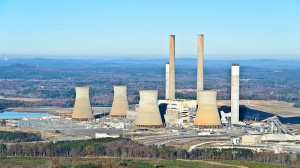
Georgia Power's Plant Bowen (above) has been upgraded with pollution-reducing scrubbers, but many units are uneconomical to upgrade due to low cost natural gas and other economic factors.
Georgia Power, the largest subsidiary of Atlanta, Ga.-based Southern Co., announced it is seeking to retire 15 coal- and oil-fired units at four plants across the state.
The utility cited several contributing factors, including current and future economic conditions, low natural gas prices and the cost of compliance with future environmental regulations, for its decision to retire the aging units, some of which have been in operation since 1950.
Here is a quote from Georgia Power President and CEO Paul Bowers issued in a press statement today:
“We recognize the significant impact that these retirements will have on the local communities and we took that into account when making these decisions. These decisions were made after extensive analysis and are necessary in order for us to maintain our commitment to provide the most reliable and affordable electricity to our customers. We are in the midst of a significant transition in our fleet that will result in a more diverse fuel portfolio – including nuclear, 21st century coal, natural gas, renewables and energy efficiency – to ensure we maintain our commitment for generations to come.”
Many of the units slated for retirement will be converted to natural gas or biomass. Additionally, the company says it will convert a coal-fired unit from Central Appalachian Coal to Powder River Basin coal.
According to the company’s press statement, the rest of its coal-fired units are already in the process of installing additional environmental controls in order to comply with the U.S. Environmental Protection Agency’s pending Mercury Air Toxics rule. Georgia Power currently operates 11,387 MW of coal-fired generation at 10 plants across the state. The planned retirements total 2,061-megawatts.
Once the plans are approved by state regulators the utility will retire most of the units before the U.S. Environmental Protection Agency’s Mercury and Air Toxics rule goes into effect on April 16, 2015.



Leave a Reply